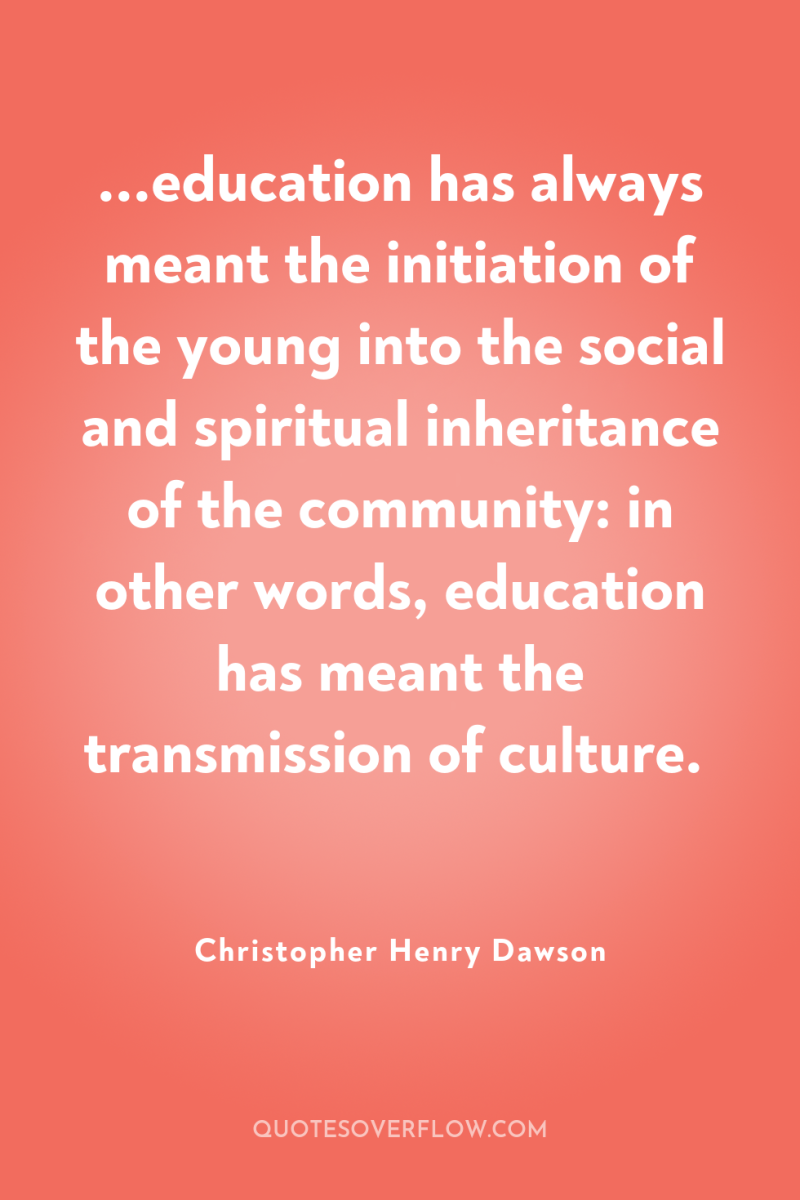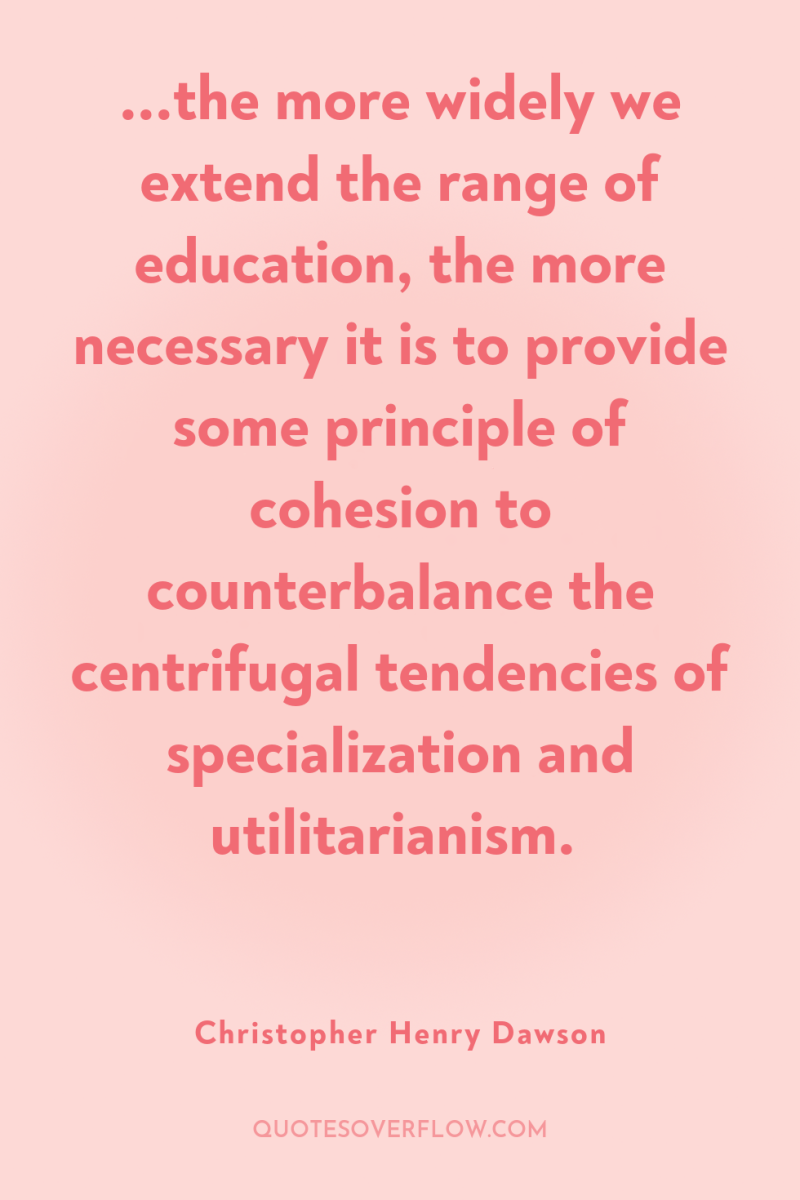1
The process of secularisation arises not from the loss of faith but from the loss of social interest in the world of faith. It begins the moment men feel that religion is irrelevant to the common way of life and that society as such has nothing to do with the truths of faith.Christopher Henry Dawson
2
Today everybody admits that something is wrong with the world, and the critics of Christianity are the very people who feel this most. The most violent attacks on religion come from those who are most anxious to change the world, and they attack Christianity because they think that it is an obstructive force that stands in the way of a real reform of human life. There has seldom been a time in which men were more dissatisfied with life and the more conscious of the need for deliverance, and if they turn away from Christianity it is because they feel that Christianity is a servant of the established order and that it has no real power or will to change the world and to rescue man from his present difficulties. They have lost their faith in the old spiritual traditions that inspired civilization in the past, and they tend to look for a solution in some external practical remedy such as communism, or the scientific organisation of life; something definite and objective that can be applied to society as a whole. .Christopher Henry Dawson
3
When men follow justice the city blooms, the earth bears rich harvests, and children and flocks increase; but for the unjust all nature is hostile, the people waste away from famine, and a whole city may reap the evil fruit of one man's ill deeds.Christopher Henry Dawson
4
The whole tendency of modern life is towards scientific planning and organisation, central control, standardisation, and specialisation. If this tendency was left to work itself out to its extreme conclusion, one might expect to see the state transformed into an immense social machine, all the individual components of which are strictly limited to the performance of a definite and specialised function, where there could be no freedom because the machine could only work smoothly as long as every wheel and cog performed its task with unvarying regularity. Now the nearer modern society comes to the state of total organisation, the more difficult it is to find any place for spiritual freedom and personal responsibility. Education itself becomes an essential part of the machine, for the mind has to be as completely measured and controlled by the techniques of the scientific expert as the task which it is being trained to perform. .Christopher Henry Dawson

5
...education has always meant the initiation of the young into the social and spiritual inheritance of the community: in other words, education has meant the transmission of culture.Christopher Henry Dawson
6
Classical education was only half the old system of European education--below it and above it there was the religious education that was common to the whole people, and the higher theological education that was peculiar to the clergy, who provided the majority of the teachers in both the other departments of education. Now the lowest level of this structure, which has been least studied and least regarded, was the most important of them all. It is true that it differed considerably in different parts of Europe, but for the religious rather than material reasons. In Protestant Europe it was founded on the Bible and the catechism, whereas in Catholic Europe it was based on the liturgy and on religious art and drama and mime, which made the Church the school of the people. But in either case it provided a system of common beliefs and moral standards, as well as the archetypal patterns of world history and sacred story which formed the background of their spiritual world.Christopher Henry Dawson
7
The obvious difficulty that has prevented the study of European culture becoming a part of the regular curriculum of studies is its vastness and its complexity. The great advantage of classical education was the fact that it involved the study of only two languages and two literatures and histories. But European culture has produced about twenty vernacular literatures, and its history is spread out among an even larger number of political communities. At first sight it is an unmanageable proposition and we can understand how educationalists have so often come to acquiesce in a cultural nationalism which at least saved them from being overwhelmed by a multiplicity of strange tongues and unknown literatures. But the true method, it seems to me, is rather to find the consitutive factors of the European community and to make them the basis of our study. This means reversing the traditional nationalist approach which concentrated the student's attention on the distinctive characteristics of the national cultures and disregarded or passed lightly over the features that they shared in common. It means also that we should have to devote much more attention to the religious development, since it was in religion that Europe found its original basis of unity. .Christopher Henry Dawson

8
...the more widely we extend the range of education, the more necessary it is to provide some principle of cohesion to counterbalance the centrifugal tendencies of specialization and utilitarianism.Christopher Henry Dawson
9
..the establishment of a universal system of public education inevitably changed the relations of education to the state. It is this above all else which has caused the mind of our society to lose its independence, so that there is no power left outside politics to guide modern civilization, when the politicians go astray. For in proportion as education becomes controlled by the state, it becomes nationalized, and in extreme cases the servant of a political party.Christopher Henry Dawson
10
For the immense extension of the scale of education and its ramification into a hundred specialisms and technical disciplines has left the state as the only unifying element in the whole system. In the past the traditional system of classical education provided a commo intellectual background and a common scale of values which transcended national and political frontiers and formed the European or Western republic of letters of which every scholar was a citizen.Christopher Henry Dawson
11
In spite of this, there is no doubt that the modern European and American system of universal education suffered from serious defects. In the first place, the achievement of universality was purchased by the substitution of quantitative for qualitative standards. Education was accepted as a good in itself and the main question was how to increase the total output: how to teach more and more people more and more subjects for longer and longer periods. But in proportion as education became universal, it became cheapened. Instead of being regarded as the privilege of a few it became a compulsory routine for everybody.Christopher Henry Dawson
12
The great fault of modern democracy -- a fault that is common to the capitalist and the socialist -- is that it accepts economic wealth as the end of society and the standard of personal happiness.. The great curse of our modern society is not so much lack of money as the fact that the lack of money condemns a man to a squalid and incomplete existence. But even if he has money, and a great deal of it, he is still in danger of leading an incomplete and cramped life, because our whole social order is directed to economic instead of spiritual ends. The economic view of life regards money as equivalent to satisfaction. Get money, and if you get enough of it you will get everything else that is worth having. The Christian view of life, on the other hand, puts economic things in second place. First seek the kingdom of God, and everything else will be added to you. And this is not so absurd as it sounds, for we have only to think for a moment to realise that the ills of modern society do not spring from poverty in fact, society today is probably richer in material wealth than any society that has ever existed. What we are suffering from is lack of social adjustment and the failure to subordinate material and economic goods to human and spiritual ones.Christopher Henry Dawson
13
But its exclusive character and irreconcileable hostility to the religious cults and ceremonies with which the whole social life of the city-state and the empire were inseparably connected at every turn, brought the Christians into inevitable conflict with the government and with public opinion. To the man in the street, the Christian was an anti-social atheist who would take no part in the public feasts and the games, which played such a large part in city life. To the authorities he was a passive rebel, who would neither take his share of municipal offices nor pay loyal homage to the Emperor. Hence the rise of persecution, and the driving of the Christians into an underground existence, as a proscribed sect. The Church grew under the shadow of the executioner's rods and axes, and every Christian lived in the peril of physical torture and death. The thought of martyrdom coloured the whole outlook of early Christianity. But it was not only a fear, it was also an ideal and a hope. For the martyr was the complete Christian, he was the champion and hero of the new society and its conflict with the old, and even the Christians who failed in the moment of the trial - the lapsi - looked on the martyrs as their saviours and protectors .Christopher Henry Dawson
14
The man who is fond of books is usually a man of lofty thought, and elevated opinions.Christopher Henry Dawson
15
Happy is the people that is without history. And thrice is the people without sociology.Christopher Henry Dawson
16
Culture was actually humanity’s attempt to extend the womb.Christopher Henry Dawson